Zhaleh Feizollahi
CRAG-MM: Multi-modal Multi-turn Comprehensive RAG Benchmark
Oct 30, 2025



Abstract:Wearable devices such as smart glasses are transforming the way people interact with their surroundings, enabling users to seek information regarding entities in their view. Multi-Modal Retrieval-Augmented Generation (MM-RAG) plays a key role in supporting such questions, yet there is still no comprehensive benchmark for this task, especially regarding wearables scenarios. To fill this gap, we present CRAG-MM -- a Comprehensive RAG benchmark for Multi-modal Multi-turn conversations. CRAG-MM contains a diverse set of 6.5K (image, question, answer) triplets and 2K visual-based multi-turn conversations across 13 domains, including 6.2K egocentric images designed to mimic captures from wearable devices. We carefully constructed the questions to reflect real-world scenarios and challenges, including five types of image-quality issues, six question types, varying entity popularity, differing information dynamism, and different conversation turns. We design three tasks: single-source augmentation, multi-source augmentation, and multi-turn conversations -- each paired with an associated retrieval corpus and APIs for both image-KG retrieval and webpage retrieval. Our evaluation shows that straightforward RAG approaches achieve only 32% and 43% truthfulness on CRAG-MM single- and multi-turn QA, respectively, whereas state-of-the-art industry solutions have similar quality (32%/45%), underscoring ample room for improvement. The benchmark has hosted KDD Cup 2025, attracting about 1K participants and 5K submissions, with winning solutions improving baseline performance by 28%, highlighting its early impact on advancing the field.
Can You be More Social? Injecting Politeness and Positivity into Task-Oriented Conversational Agents
Dec 29, 2020
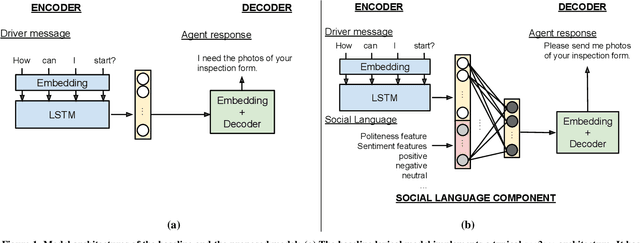


Abstract:Goal-oriented conversational agents are becoming prevalent in our daily lives. For these systems to engage users and achieve their goals, they need to exhibit appropriate social behavior as well as provide informative replies that guide users through tasks. The first component of the research in this paper applies statistical modeling techniques to understand conversations between users and human agents for customer service. Analyses show that social language used by human agents is associated with greater users' responsiveness and task completion. The second component of the research is the construction of a conversational agent model capable of injecting social language into an agent's responses while still preserving content. The model uses a sequence-to-sequence deep learning architecture, extended with a social language understanding element. Evaluation in terms of content preservation and social language level using both human judgment and automatic linguistic measures shows that the model can generate responses that enable agents to address users' issues in a more socially appropriate way.
Controllable Text Generation with Focused Variation
Sep 25, 2020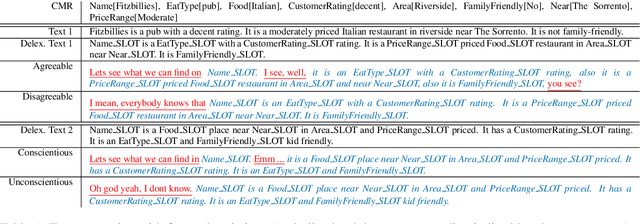
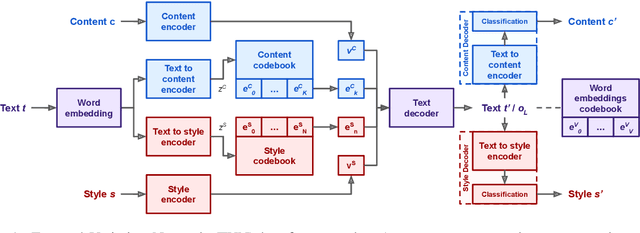
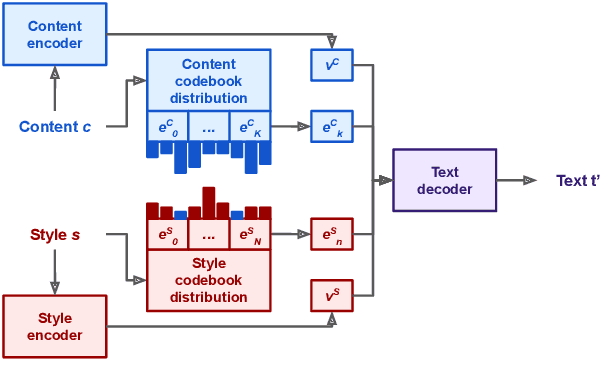
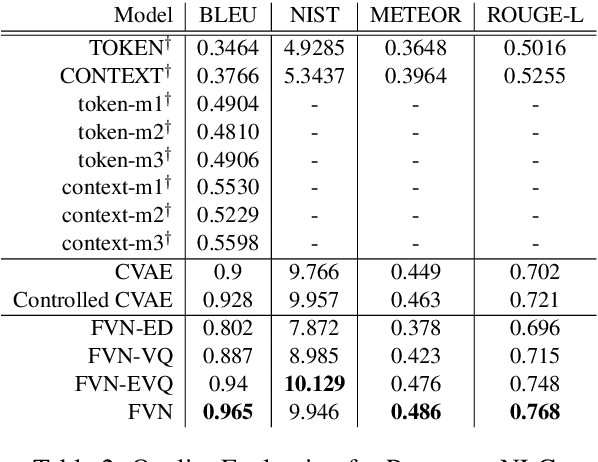
Abstract:This work introduces Focused-Variation Network (FVN), a novel model to control language generation. The main problems in previous controlled language generation models range from the difficulty of generating text according to the given attributes, to the lack of diversity of the generated texts. FVN addresses these issues by learning disjoint discrete latent spaces for each attribute inside codebooks, which allows for both controllability and diversity, while at the same time generating fluent text. We evaluate FVN on two text generation datasets with annotated content and style, and show state-of-the-art performance as assessed by automatic and human evaluations.
 Add to Chrome
Add to Chrome Add to Firefox
Add to Firefox Add to Edge
Add to Edge